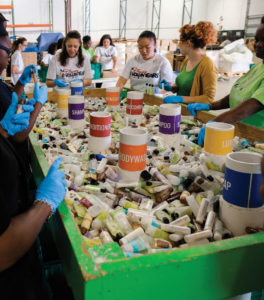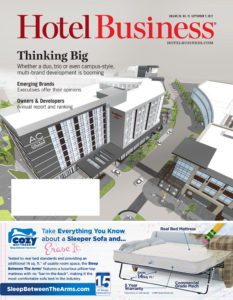ORLANDO, FL—Anyone wondering what happens to all those hardly used guest-bathroom amenities should ask Shawn Seipler, CEO of Clean the World.
Almost a decade ago, the then-executive for an e-commerce tech company found himself in a Minneapolis hotel room, looking at his slightly used bar of soap and wondering the same thing. His next step would change his life, along with the lives of men, women and children across the globe—and help raise the consciousness of the lodging industry around how small items can make a big difference.
That fateful night, Seipler made a phone call to the front desk with his query and was informed that all the soaps were thrown away and destined for landfills.
“I immediately went to my computer and did some math and figured out we were throwing away probably a million bars of soap every day out of hotels across the United States. That was the first moment for me that was, ‘Wow, there’s a huge amount of waste, and I’ve got to really believe there are easy ways to recycle soap,’” he said.
The thought didn’t leave him, and in 2009, Seipler launched Clean the World, a not-for-profit organization based here that collects, sorts and processes discarded soap, shampoo, conditioner and body lotion/gel/wash from participating hotels, both independent and chain-affiliated, and recycles them for distribution to those in need around the world.
The catalyst for Seipler was studies that showed 9,000 children under the age of five were dying every day due to pneumonia and diarrheal disease. “All these studies laid out in front of me said that if we gave them soap and taught them how and when to wash their hands, that we could cut those deaths in half,” said Seipler.
Seeing the potential in leveraging the discarded amenities, he brought family and friends together to advance his idea and dedicated himself to establishing what would become Clean The World (CTW).
Starting out in a single-car garage space that today has become warehouse space in Las Vegas, Orlando and Hong Kong, Seipler’s first hotel “donor” was the Holiday Inn at the Orlando Airport.
“I walked in and said, ‘We’re going to start taking soap and recycling it. I want to know if you guys want to be involved. I’ve got bins for you and you can start collecting.’ They said, ‘Yes. Very interesting. We want to do it.’ I can still remember the general manager’s name—Peter Favier. It was very easy,” he said.
Seipler acknowledged there was no business model at the start. “We’d put down bins, put stuff in them, collect them. We had to figure a lot of it out after that first moment.”
As he was doing that, the industry was suffering the effects of the recession, bringing additional challenge to Seipler, particularly when the fledgling CTW transitioned from providing the bins and collecting them for free to a fee-based operation.
“The challenge came when we circled back and said, ‘We need you to pay for this program. It’s now a recycling program that you need to buy,’” said the CEO.
Early adopters saw value in the program and paid the $1 per room, per month that helped pave the way for CTW to get some true traction.
Seipler started at the property level then gradually worked up to contacting hotel franchisers; however, it was some positive press, especially a CBS Evening News piece broadcast nationally, that brought hoteliers to his door from California, Colorado, Oregon, Canada and other environment-friendly regions.
“Then we had to figure out how to ship across the country,” recalled the CEO, noting FedEx, then UPS, became part of the mix.
The learn-as-you-go enterprise might have been daunting for some, but Seipler was committed to Clean the World’s premise. He even quit his job so he could move the concept faster and farther.
Today, Seipler and CTW are well known within the hotel industry.
“We have 5,000 hotels in our program. We have corporate agreements with all the majors: Hilton, Marriott, IHG, Wyndham, Hyatt. We just last year started doing brand standards so even though we had the corporate agreements (which recommends the program to owners), we still had to sign up the management companies. Now we have 100 management companies on board with us, such as Concord [Hospitality] and Hersha [HHM]. We also have brands like Las Vegas Sands, Caesars, Mandarin [Oriental]. Now what we’ve started to see is brands coming on board. Hilton’s all-suites brands came on board end of last year—Homewood Suites, Embassy Suites and Home2 Suites—all across America, every one of them on board on a brand standard,” said Seipler, noting there are more such brandwide programs in the pipeline.
CTW also has a partnership with Guest Supply. “We’ve developed a model with them where we’re now embedding our program into the amenity cost and that has opened us up to doing these partnerships with other amenity partners. So now when the hotels are buying their amenities, the Clean the World recycling program is embedded in that rate. Now it’s seamless… We just launched that and we’re seeing some great success there,” said Seipler. “Guest Supply also has a strong commitment to sustainability and CSR (corporate social responsibility), so they actually have funding they’re making available to put into some of these deals to encourage their customers to join the Clean the World program. Hopefully, we’ll see that trend continue,” he said.
In addition to its hotel recycling program fees, CTW is supported by direct cash donations, grants and gift-in-kind donations such as hygiene amenities and soap.
CTW has strong relationships with the American and International Red Cross, the United Nations, UNICEF, World Vision and NGOs (non-governmental organizations). It also has hotel partnerships in six countries in Asia and 20 countries in Europe, and is looking to get operations into Mainland China, Southeast Asia and the Middle East.
In addition to delivering soap to disadvantaged and undeveloped regions, CTW also distributes standard hygiene kits, as well as those customized for men, women and children, and distributes them at homeless shelters. Standard kits include a recycled bar of soap; repurposed shampoo, conditioner, lotion and body wash; a new toothbrush and toothpaste; a disposable razor; a washcloth; and an inspirational message. A kid’s kit has items such as a coloring book, and a kit for homeless veterans includes shaving cream, deodorant and socks.
“Our hotel partners are presenting this option to meetings and events and corporate customers,” said Seipler. As a group CSR session, for example, participants form assembly lines and create the hygiene kits and donate them to local homeless shelters. “We coordinate all of that,” said Seipler, who is seeing enthusiasm for the offering.
With that success in mind, the CEO is now considering launching other types of kits, such as meal or medical kits.
“We’re also looking for other materials [to take]out of hotels. We will expand beyond soap and bottled amenities,” he said. “We’re working on a really exciting project right now that will continue to take opportunities out of hotels’ waste streams and recycle and upcycle them into new CSR products we can offer people to make the world a better place.”
Seipler said since CTW’s inception, it’s distributed 40 million bars of soap and has seen a 35% reduction in the death rate from diarrheal disease and pneumonia. He acknowledged he’s extremely grateful to the hotel industry for jumping on board—and, yes, he’d welcome more properties—and helping him and CTW fulfill their mission. HB


